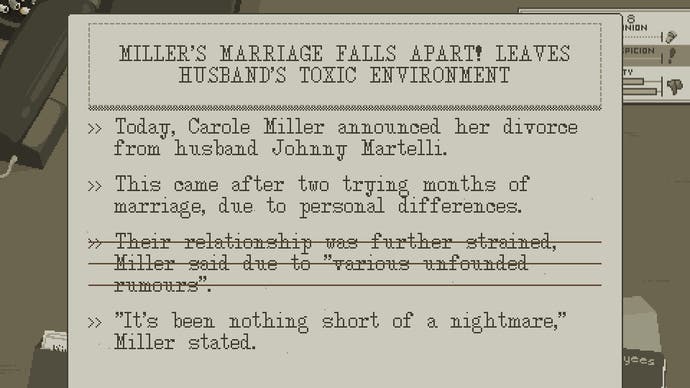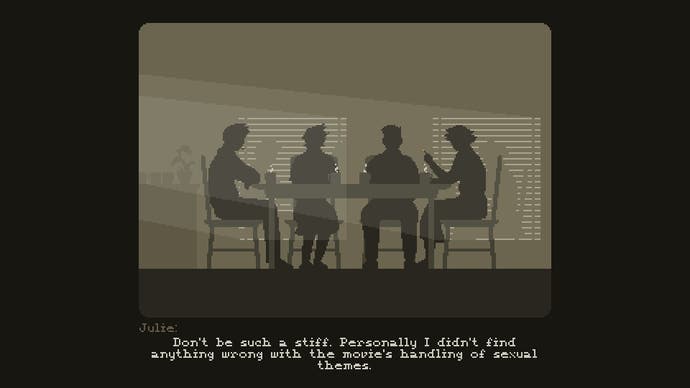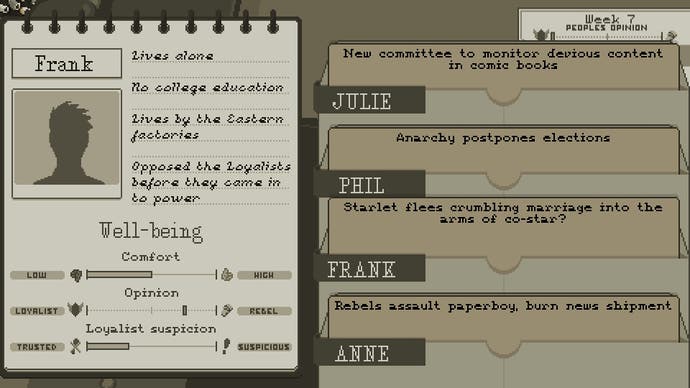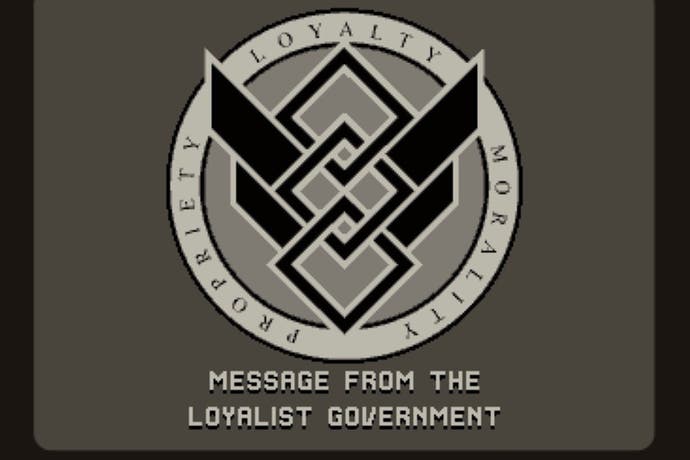The Westport Independent review
It's about ethics in real journalism.
Though Pravda is well-known as the Russian Communist Party's official newspaper, it's always worth remembering that it didn't start out like that. Pravda was initially a magazine that covered the arts, literature and society-at-large, before being taken over at editorial level by Bolsheviks and becoming the organ of record for tractor production. At some point there was a fork in the road. The Westport Independent gives you, as editor of the last free newspaper in a totalitarian state, the choice of which way to go.
As a somewhat minimalist game about performing bureaucratic tasks under dictatorship, the seemingly-unavoidable comparison point for The Westport Independent is Lucas Pope's excellent Papers, Please. But appearances can be deceptive, and The Westport Independent is in form something more akin to a visual novel - the central interaction, as the editor of a weekly paper, is reading through prospective articles and either censoring or slanting them to support a particular side. Then you publish, and watch.
On one side there's the Loyalist government, who give the game its timescale with an act that will muzzle the press in 12 weeks, and on the other are the ragtag Rebels - unionists, Corbyn fans and all manner of other scum. But then there are your four staff, who each have their own leanings, and who will ultimately bear responsibility for any articles with their byline. Phil is a right-leaning toady, for example, and will happily see the government's side in everything. Frank's a rebel, a true journalist out to expose some crooks and right wrongs.

Each has their own life away from the paper that affects how they think about particular issues - Anne has a child so will be interested in stories about how the government is trying to shape education, but that same fact may also weigh heavily on the shoulders of a Rebel-inclined editor. After publishing you see the four employees have a brief discussion about the newspaper's stories and direction, and afterwards get stats about that issue's effect on the populace - and what the government thinks of it.
Most of The Westport Independent's impact comes from the articles you're editing and, in particular, seeing contemporary issues re-packaged in the Loyalist style. A story about the police apprehending a child murderer, on closer inspection, is about a midwife who'd helped a 14 year-old girl have an abortion. You can take this story and emphasise the 'murder' angle, obscuring the fact it was an abortion and the mother's age. Or you can emphasise the circumstances, chide the government, and wonder if it'll do any good. Such moments can't help but make you think about how the abortion debate is framed in places like Northern Ireland, the power of words like murder, and the kind of people who shout them.
On my first playthrough I followed my heart and went full-on Rebel scum, slanting all stories to be anti-government and suppressing stories that showed Rebel groups in a bad light. It was perhaps predictable that, after six weeks of this, my rabble-rouser-in-chief Frank simply... disappeared.
Losing a member of staff is not just a narrative beat. Each reporter can only write one story a week so, quite simply, if you lose one your paper loses a quarter of its potential impact. You cover less stories and the paper becomes less capable. Westport itself is divided into four areas of distribution and, in each of these, different types of story are preferred, from celebrity news to industrial shenanigans and straight-up political coverage: balancing what the people want with what the people get is the editor's most important skill.

This means you often end up choosing coverage that appeals to a particular area rather than the most important stories in Westport, and sneaking in the real stuff under cover of celebrity. In my Rebel playthrough, keeping celebrity news going and focusing in on government corruption and brutality meant things went relatively well for the cause of freedom. Comrade Frank's brave sacrifice meant the populace was already primed to hear of more flagrant misbehaviour and, by keeping sales up, I was able to stoke the populace's anger at the heavy-handed Loyalists with big-impact issues in the final weeks. The paper eventually limped through the twelfth issue with only two staff, but when the censorship act was passed there was rioting across two of Westport's four boroughs - not quite the French revolution, but I'll take it.
At this point I found The Westport Independent charming, but its structure means the game has to maintain this over multiple playthroughs - each period of 12 weeks will take about an hour. So it was that I suited-up as a full-on Loyalist determined to spread the good word, and one of the pleasing things is that your staff aren't quite so pliable. When I wanted to plant an especially juicy anti-rebel line about their assaulting a paperboy, and toadie-in-chief Phil was already writing about the glorious President's birthday, it was such flagrant spin that two of them refused.
Thankfully Anne turned out to be happy to write the story, and the propaganda made it into the paper friction-free. This was curious because she would normally be quite rebellious, and I reasoned it must have something to do with her own status as a parent and thus sympathy for the paperboy (who really was assaulted, though I'd sexed it up.) This is one of The Westport Independent's best qualities, and sorely underused - whether it really was down to Anne's own child or simply various background stats is irrelevant, because it's a convincing detail. But the cause-and-effect of your decisions is often so ambiguous such links are few, and so the relation between your actions and the journalists comes to feel unsatisfying.
This is the tip of a major flaw, which is that The Westport Independent is a game with four main characters who aren't terribly well-characterised. You never feel like you know these people, or that there's much reason to care for them beyond keeping the newspaper running - the human element is lacking.

As these problems mount the simplicity of The Westport Independent's interactions begins to drag - it's not the kind of game you'd replay for the mechanics. And the repetition is further emphasised by a nasty habit of circulating old stories - ones you've printed weeks ago - in the game's later weeks, which will appear with the edits you'd already made back then. Maybe it's a wry comment on the space-filling techniques of certain papers, but in what is already such a slight game it's a repeat too far.
All of these unsatisfying elements - the characterisation, the impact that following certain storylines has - come down to feedback. Part of the appeal of this game's concept is surely seeing your editorial decisions influence the populace, the totalitarian government, and your staff. In a sense you do, but seeing opinion bars and occasional letters from Loyalist or Rebel factions never feels quite enough. Some may see this as subtlety, but there's none of this in the newspaper articles themselves (which are always resolutely pro- or anti- a certain faction) and so it ends up detracting from multiple playthroughs.
The Westport Independent is a game that wants you to replay it and see what taking different decisions will do. But these are never marked enough in your day-to-day existence as editor - yes you'll get letters, follow up on different stories, and maybe lose different staff at different times. But the atmosphere never feels different whether you're running Rebel HQ or acting as the Loyalist party's propaganda arm.
When you add this to the basic interactions at the heart of The Westport Independent, which are serviceable but hardly a reason to play in their own right, this is a game that starts off interesting but then rapidly palls. The concept is great, and the execution of the editor's desk is accomplished. But outside of that window on the world, The Westport Independent never feels like you're running a newspaper so much as toying with stat bars. Westport itself remains an abstraction, your staff never quite interesting enough to compromise for. There are the makings of a much better game here, but the one that exists is [REDACTED]

